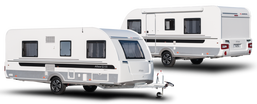
Let's have a look at what occurs when you're struck by wind, how to deal with it when it happens, and what you can do to make your caravan travel as safe as possible.
When a wind gust causes the moving caravan to sway (technically known as 'yaw'), that yawing force is usually counteracted by the tow vehicles inertia, plus the grip of the van’s tyres on the road.
Quite often during caravan travel, you will experience nothing more than one or two lurches in your van. In some cases, especially when adding other factors, such as slippery roads, it increases the chance that the caravan can over-correct, thus yawing in the opposite direction. This leads to amplified swaying which, if not corrected, could possibly cause the van to roll.
HOW TO DEAL WITH YAWING
It might not always be possible, but the best way to react when the caravan starts to sway or snake is to drive slowly and stay in control.
- Remain calm
- Avoid applying the brakes of the tow vehicle. If your van is fitted with an electric brake system, use the manual control in the towing vehicle to slow it down, or if fitted with AL-KO ESC, BPW IDC or DEXTER DSC like in most of our hire vans, let this system do it for you automatically.
- Avoid trying to steer out of the sway.
- Maintain a constant speed until the swaying stops and the caravan straightens out again.
- After it has stabilised, pull over and check that the load in the caravan has not shifted.
A good electronic stability control system, such as AL-KO ESC, BPW IDC or DEXTER DSC will monitor for critical driving situations, such as a build up of swings or one large sudden lateral movement. When needed it activates and applies the caravan brakes immediately without driver intervention, preventing further oscillation.
You can lessen the potential for disaster by ensuring you have the best sway control system and being aware of the conditions that you are driving in at all times.
All of our hire caravans excluding Jayco are fitted with AL-KO ESC, BPW IDC or DEXTER DSC systems thereby enhancing your safety.

 RSS Feed
RSS Feed

